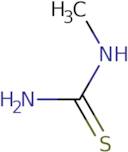N-Methylthiourea
CAS: 598-52-7
Rif. 3D-FM36216
| 5g | Fuori produzione | ||
| 10g | Fuori produzione | ||
| 25g | Fuori produzione | ||
| 50g | Fuori produzione | ||
| 100g | Fuori produzione |
Informazioni sul prodotto
- 1-Methyl-2-thiourea
- 1-Methylthiocarbamide
- 1-Methylthiourea
- Methylthiocarbamide
- Methylthiourea
- Monomethylthiourea
- N-Methyl thiourea
- N-Methyl-2-thiourea
- N-Methylthiocarbamide
- NSC 30213
- Vedi altri sinonimi
- Pseudourea, 1-methyl-2-thio-
- Thiourea, N-methyl-
- Thiourea, methyl-
- Urea, 1-methyl-2-thio-
N-Methylthiourea is a trifluoroacetic acid that reacts with the nitrogen atoms of amines to form N-methylthiourea, which can be used in pharmaceutical preparations. It has been shown to have immunosuppressive effects by inhibiting the production of inflammatory cytokines and regulating the expression of adhesion molecules. N-Methylthiourea's mechanism of action is not fully understood, but it is believed to involve hydrogen bonding interactions and electrochemical impedance spectroscopy. The drug binds to the mitochondrial membrane potential by reacting with the hydrogen bond between a hydrogen atom and an oxygen atom on one side of the membrane and a nitrogen atom on the other side. This binding leads to a decrease in mitochondrial membrane potential, which may cause cell death or apoptosis.





